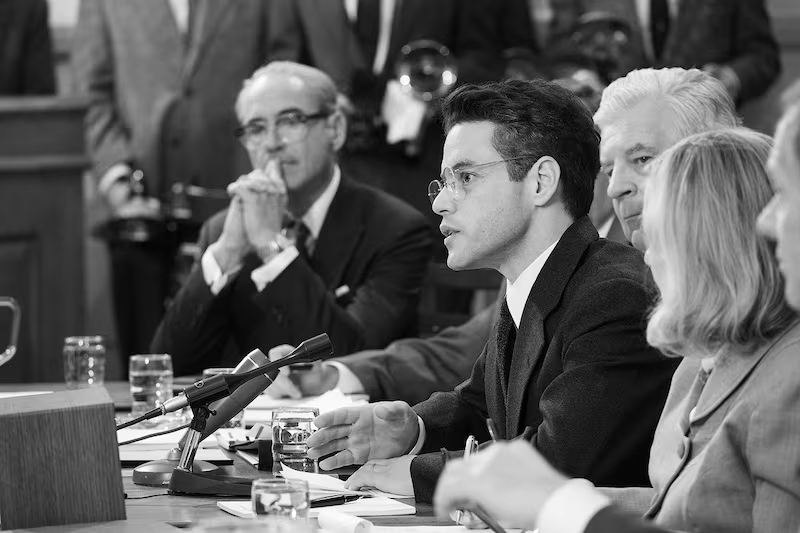Since winning the Best Actor Oscar in 2019, Rami Malek’s career has taken a turn for the… less Oscar-winning. Perhaps it’s because he received that honor for the much-maligned Bohemian Rhapsody, a film whose accolades astounded and annoyed critics aplenty. But subsequent roles in films like Bond entry No Time to Die and last year’s box-office flop Amsterdam were either similarly criticized or, in the case of the latter, far from substantial to start with.
When he silently popped up an hour or so into Oppenheimer, then, it seemed like the latest meager appearance from a once-buzzy actor. (By 2019, he’d already won an Emmy, a Golden Globe, and an Oscar.) That Malek ends up starring in one of the film’s most searing, powerful moments came as a gigantic surprise. And it was a welcome one—J. Robert Oppenheimer (Cillian Murphy) had his own unqualified win, all thanks to Malek’s Dr. Hill.
As Hill, Malek plays one of the scientists working on the Manhattan project, albeit not with Oppenheimer directly. Instead, he works with Dr. Enrico Fermi (Danny Deferrari) at a lab in Chicago. While Fermi’s team create the nuclear reactor, both Fermi and Hill remain steadfast about the atomic bomb not being used directly on cities.
Despite holding this belief, Malek’s Dr. Hill is a man of almost no words. Instead, he mostly appears alongside Fermi, trying to offer Oppenheimer a petition to look at: the Szilárd petition, which 70 scientists signed and sent to President Truman in protest of bombing the Japanese. The two times that this occurs, however, Oppenheimer knocks Hill’s hand away in frustration. It’s a humbling role for Malek, as he is seen primarily as a minor annoyance in his scant appearances.
For much of the runtime, Malek’s Oppenheimer performance was so small as to almost appear like the result of a Faustian bargain. Yes, he could be in one of the guaranteed biggest movies of the year, but only if he agreed to keep his mouth shut the entire time. By the second time he showed up and said nothing, I openly laughed. Unpopular Best Actor winners stay losing, I guess.
Except that in Oppenheimer, this oft-mocked Best Actor honoree reminds us how he managed to collect all those awards in the first place. Malek holds his tongue for much of the film, only to let it rip as the film reaches its denouement—set years after he was but a petition-holding no-name in Oppenheimer’s periphery.
Oppenheimer’s structure includes two parallel timelines: one following the journey of the physicist’s horrible creation, the other following the events surrounding Lewis Strauss’s (Robert Downey, Jr.) congressional confirmation hearing. He was up for a Cabinet position in Eisenhower’s White House, a long-held dream of his that he’s been masterminding for years. The film builds up to revealing why Strauss is such a meaningful figure in Oppenheimer’s life: Strauss conspired to have Oppenheimer named as a communist, based on his petty dislike for the man. Being that this was the mid-’50s, such a claim was among the worst possible accusations a government employee could face.
The film establishes this as a thrilling courtroom drama, in which we root for the beleaguered “father of the atom bomb”—something that, at that point, is otherwise hard to do. We know that much of what he’s being accused of is neither relevant to his scientific achievements nor accurate; the assertion that Oppenheimer opposed the hydrogen bomb so as to set the Soviets up for a win against the States was a clear falsity.
Strauss himself admits to his aide, played by Alden Ehrenreich, that his great dislike for Oppenheimer encouraged him to help get the scientist’s government clearance revoked and effectively end his career. But he’s a charmer, and public opinion has long soured on Oppenheimer; Strauss’ confirmation for the Cabinet seems all but assured—until Dr. Hill is brought in to testify at the hearing.

Hill shows up to quietly, confidently, clearly call out Strauss for his wrongdoing. As the then-chairman of the Federation of American Scientists, his word held clout—so when he said that Strauss’ unfair damnation of Oppenheimer stoked the ire of the entire scientific community, it meant something. Malek’s typically measured cadence lends his performance a rousing gravitas, especially from a character who had up to this point been a distracting piece of wallpaper. Sitting before Congress, Malek’s Hill offers a searing indictment of Strauss, the character we have come to learn is Oppenheimer’s villain, all in a scant two minutes.
To tout Malek as a surprise witness at Oppenheimer’s turning point feels like the film showing all of its cards in the eleventh hour. It’s made more effective by the fact that his presence was felt before, albeit for the opposite reason. As Hill, he was largely a nonentity in Oppenheimer’s crew. In his one big scene, in which he forcefully shames Strauss for manipulating Hill’s fellow scientists into affirming Oppenheimer’s alleged communism, his presence is impossible to ignore; if he had more lines as an even smaller part of the large ensemble, perhaps his damning piece of testimony would have felt like less of a secret weapon.
This heel turn was especially striking, considering that Hill’s opinion of Oppenheimer seemed less positive beforehand. The physicist had repeatedly rejected Hill, who openly opposed the government’s use of Oppenheimer’s greatest invention.
Thanks to Hill, the film tells us, Strauss doesn’t get the Cabinet position he so badly wants—a win as much as any in a movie like Oppenheimer. And it’s the first career win Malek’s had in a while too: a moment in the spotlight that elicits gasps, applause, and a deserved heaping of praise.
Keep obsessing! Sign up for the Daily Beast’s Obsessed newsletter and follow us on Facebook, Twitter, Instagram and TikTok.
Read more of our Oppenheimer coverage HERE.






